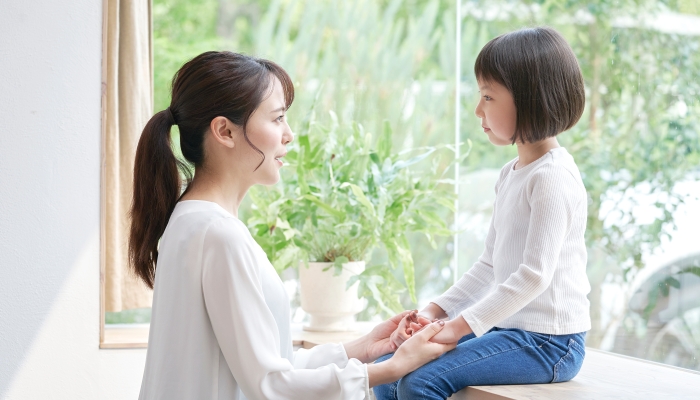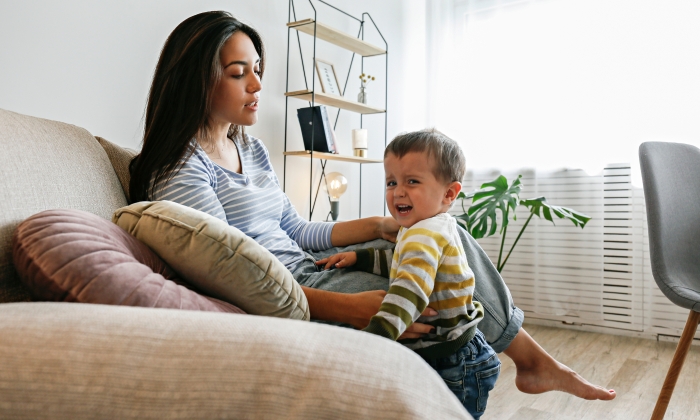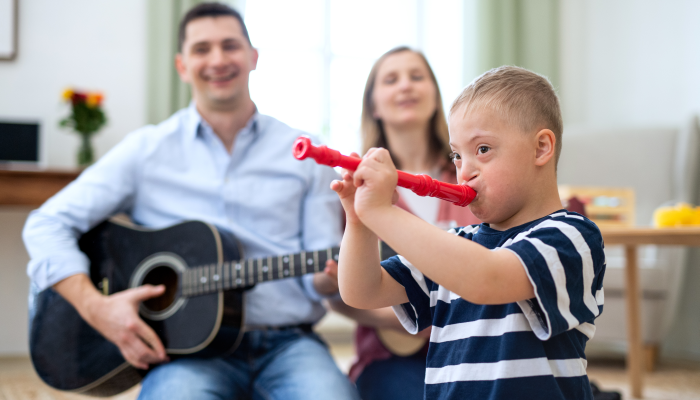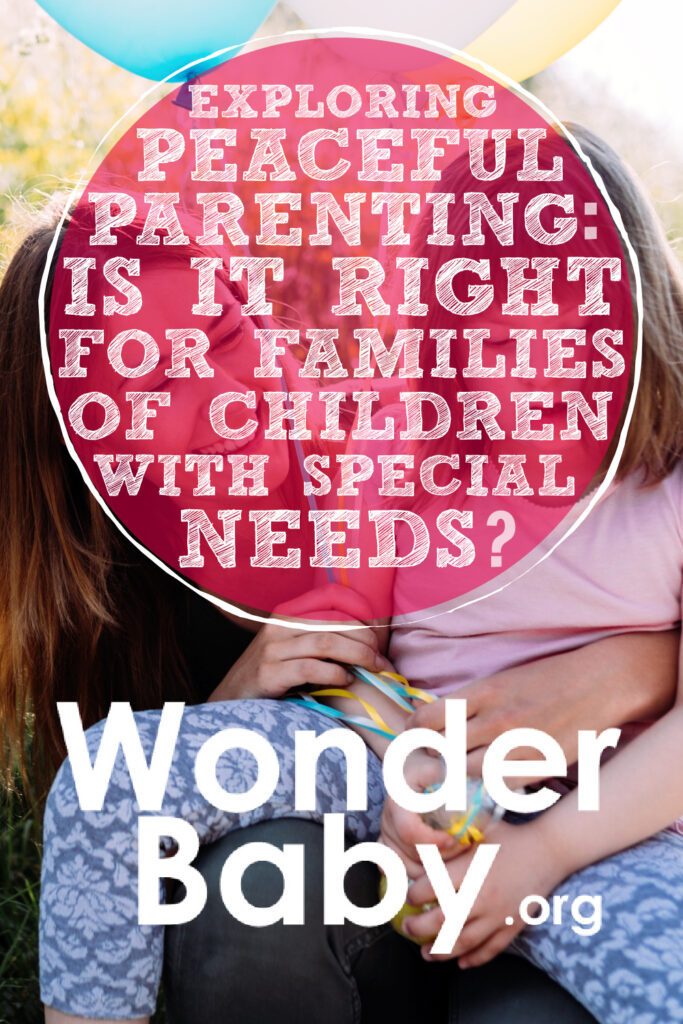Exploring Peaceful Parenting: Is It Right for Families of Children with Special Needs?

- Peaceful parenting is a parenting method developed by Dr. Laura Markham.
- It’s based on parental emotional regulation and creating a strong bond between parents and children.
- In peaceful parenting, parents correct child behavior and set limits by acknowledging children’s feelings, modeling self-regulation, and showing empathy to their children while reinforcing their relationship.
- This method can reduce and eliminate the need for techniques like timeouts, bargaining, punishments, and consequences in favor of empathy, coaching, and understanding.
- Dr. Markham believes this method is even more important for children with special needs who can be more sensitive to their parents’ emotions and may need more support with interpersonal connection.
There are so many parenting methods, techniques, and trends out there: gentle, attachment, free-range, mindful, conscious, and soft parenting, to name a few.
Many parenting books that promote different discipline approaches often don’t consider how special needs families can incorporate these systems in helping their children. Too frequently special needs families are left out of the conversation.
Peaceful parenting, developed by Dr. Laura Markham in her book, Peaceful Parent, Happy Kids, is a method which she says is even more important to use with special needs children because it models self-regulation and deepens the connection between parent and child.
By emphasizing empathy, emotional regulation, connection, and coaching, peaceful parenting proponents say that interactions with children are less stressful and more loving, and that children listen and cooperate even when their behavior needs correcting,
So let’s find out more about this parenting approach as we explore peaceful parenting and whether it’s right for families of children with special needs.
What is Peaceful Parenting?

Peaceful parenting is a model developed by clinical psychologist, Dr. Laura Markham and first popularized in her 2012 book, Peaceful Parent, Happy Kids.
- Markham, Dr. Laura (Author)
- English (Publication Language)
- 304 Pages – 11/28/2012 (Publication Date) – Tarcher (Publisher)
Dr. Markham’s philosophy is based on three ideas:
| Regulating Your Own Emotions | If parents learn to regulate their own emotions, they become models of emotional regulation for their children. |
| Connecting With Your Child | If parents build a close, connected relationship with their children, family life will be happier with less conflict. |
| Coaching Instead of Controlling | If parents coach, instead of controlling their children, children will feel respected and will want to cooperate with their parents. |
Dr. Markham believes that there are many benefits to peaceful parenting11. Peaceful Parent, Happy Kids! Peaceful Parent Happy Kids. https://www.peacefulparenthappykids.com/ including:
- Happier, more cooperative children.
- Happier, more relaxed parents.
- More meaningful family life.
- Emotionally intelligent, self-disciplined children.
- Removal of the need for punishment as a method of discipline.
- Children who are prepared for their future.
- A lifelong, close relationship between children and parents.
Parents say that peaceful parenting techniques reduce tantrums in children, eliminate yelling, threats, and bribery in communicating with kids, resulting in more cooperation from children and improved relationships between parents and kids of any age.
Peaceful parenting is about empathy and the relationship between parent and child in every situation. Children will still need correction and limits.
However, peaceful parenting is about the way that corrections and limits are delivered by acknowledging difficult feelings in the child, the parent self-regulating their own emotions, and reaffirming the connection between parent and child, reassuring the child that no matter what, the bond remains.
Benefits of Peaceful Parenting for Children with Special Needs

Dr. Markham believes that the methods used in peaceful parenting are even more important and effective for children with autism, ADHD, conduct disorder, DMDD, or other developmental challenges.
For example, children with special needs may have more difficulty with emotional self-regulation. They may also be more sensitive to the emotions of others.
Peaceful parenting’s focus on parental self-regulation as a way to stay calm and model self-regulation for children can therefore have even more of an impact on a child with ADHD or conduct disorder who may need more support in this area.
Connection is another tenet of peaceful parenting which may be useful for special needs families. Reinforcement of the parent-child bond and always rooting any kind of discipline in the foundation of that relationship is part of Dr. Markham’s philosophy.
As another example, developing and maintaining emotional connections can be hard for children with ASD. So a parenting method that always returns to this bond can be even more important.
In addition, where much of the behavior advice for special needs families focuses on a reward and consequence model, peaceful parenting encourages removing that dynamic.
Dr. Markham says behavior challenges in special needs kids are often the result of fear, and, “When they act out of fear, they deserve love, not punishment. Of course we may need to set limits, but we can set those with love.”
Peaceful parenting followers believe their children are more cooperative because they react to challenging behavior with empathy rather than rule-based consequences. Dr. Markham believes this works with special needs kids too.
Challenges of Implementing Peaceful Parenting

Parents are still human—and often under a great deal of stress. Even with the best intentions, we will make mistakes.
Children can be demanding, uncooperative, and rebellious as a reaction to their world. Often their most challenging behaviors come out at home with their parents, where they know they are safe to experiment, be vulnerable, and even explode.
For special needs kids these behavioral blowouts at home may be more common. The effort of keeping it together emotionally, masking impulses and behaviors, and simply coping with everyday situations that their neurotypical peers navigate easily can add a heavy layer of stress to the lives of children with special needs.
Self-regulating our own behavior as parents when faced with a misbehaving or moody child can be very challenging when combined with work, financial stress, and exhaustion.
This is amplified many times over as the parent of a child with special needs who depends on your deepest reserves of patience because they just don’t understand expectations or they’re experiencing sensory overload.
Staying calm and connected may feel unattainable at times and it may just be easier just to say, “Got to your room,” “That’s a timeout,” or even, “I’ve had enough.” Trying to coach and stay connected during high stress moments can feel impossible.
Experts advise that maintaining your own physical and mental health22. Parenting children with special needs. Psychology Today. https://www.psychologytoday.com/gb/basics/parenting/parenting-children-special-needs is important to stay calm and self-regulate in the long term as a special needs parent. When you don’t feel like a “peaceful parent,” it’s OK to take a break, catch your breath, and regroup.
It’s also OK for our children to know that we make mistakes. Apologizing to our kids33. Grose, J.. How to apologize to your kids. The New York Times. 2021. https://www.nytimes.com/2021/03/10/parenting/yell-kids-apologize.html when we haven’t been the best models of behavior is another way to model self-awareness and taking responsibility for our actions.
Strategies for Adapting Peaceful Parenting to Special Needs

You know your children best. You’ve probably tried countless methods and techniques and you have probably found a few that work for you and your special needs family.
Peaceful parenting techniques may help to strengthen connection and de-escalate difficult situations. They may help you manage behavioral challenges when they happen and change your perspective on what your child needs from you, reducing your own stress and helping you to stay calm and self-regulated during intense moments.
Every child has a unique set of needs and you may need to use a combination of methods and techniques to help your child with their challenges. However, peaceful parenting encourages parents to see a given situation from their child’s point of view and to respond compassionately.
Here are two examples of how you can try peaceful parenting:
- Let’s say your child with ADHD struggles every morning to get ready for school, making the whole family late. A peaceful parenting approach to this would be a calm discussion, at a different time of day, asking your child to explain what is hard for them about the morning and expressing that you can see how that’s difficult.
Finding a solution together will be more effective and help you stay connected rather than reprimanding them every morning during a time of high stress.
- Or, perhaps your child with sensory processing disorder is having a meltdown in public. Peaceful parenting encourages you to recognize that if you are tense, it will escalate your child’s tension.
Rather than telling your child to “stop crying,” or shushing them, a peaceful parenting approach will help you recognize that they are overwhelmed, stressed, or even frightened. Comforting them in this moment and acknowledging their feelings will put a stop to the meltdown instead of intensifying it.
References
- Peaceful Parent, Happy Kids! Peaceful Parent Happy Kids. (n.d.). https://www.peacefulparenthappykids.com
- Parenting children with special needs. Psychology Today. (n.d.). https://www.psychologytoday.com/gb/basics/parenting/parenting-children-special-needs
- Grose, J. (2021, March 10). How to apologize to your kids. The New York Times. https://www.nytimes.com/2021/03/10/parenting/yell-kids-apologize.html

Related Posts

Eye Conditions and Syndromes, Visual Impairment
Neuralink Announces Plans to Restore Sight to the Blind with Brain Chip
Elon Musk’s company Neuralink has announced plans to begin human trials of its new “Blindsight” brain chip by the end of 2025.

Special Needs
5 Spring Cleaning Tips for Families of Children with Disabilities
Spring cleaning is an opportunity to create a more accessible, organized, and supportive space for your child with disabilities. Declutter, deep clean, and refresh!

Visual Impairment
The Gift of Understanding: How a Young Child Helps His Blind Father Navigate Life
When a parent is blind, it’s natural for people to wonder how their sighted child will adapt. Will they struggle to understand their parent’s needs? Will they feel burdened by...
